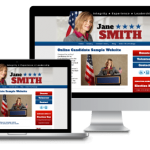 You know what they say about assumptions. In political web development, we run into a lot of them. In our experience of working with political campaigns, here are our top five myths about political campaign sites that can cost candidates visitors and support.
You know what they say about assumptions. In political web development, we run into a lot of them. In our experience of working with political campaigns, here are our top five myths about political campaign sites that can cost candidates visitors and support.
Myth 1: A candidate website is a digital brochure
A website can be a digital brochure, but that limits the possibilities. The political candidate website is the digital hub that pulls everything together. It’s the central location for updated campaign news, as a donation and volunteer portal, and a means to get voters to follow you via social media and email. Don’t limit the possibilities of the medium!
Myth 2: If you create a campaign website, it will immediately show up on Google
We get question this a lot. A client will contact us, saying, “Hey, my site launched two days ago, and I don’t see it on Google.”
Our first question is whether there are any sites or pages linking to the site. 4 out of 5 times, the answer is no. For a website to show up on Google, you usually need to do one or more of the following:
- Create links to the site from other pages, such as your social media pages.
- Create a campaign Google Account and set up Google Analytics (GA4) for your site.
- Submit a press release online and to your local media.
- Notify others through social media and encourage them to share.
- Have other sites link to your site.
- Time. The earlier you launch a site, the more ‘authority’ the site gains over time.
In other words, site owners need to take action to get search engines to notice their websites.
Myth 3: Large graphics and minimal text is good idea
Actually, it’s not. Sometimes a candidate’s ‘About Us’ page ranks higher than the site’s home page. This is because the About page has substantial content about the candidate, while the home page may just have a large picture and little text – or that copy is written in the first person.
Search engines cannot (fully) read images, so if you want to rank well for something, you need actual content for the search engines to read.
Myth 4: Everyone knows who you are
Too many campaign websites fail to put the most critical information into their site. We see some candidates not include the location of the state or municipality in the text. Sometimes they don’t even list the election date! If you want people to vote for you, you need to tell them when (and where) to vote. Don’t assume that anyone who comes to your website knows anything about you or your campaign.
Myth 5: 30 days before the election is enough time to campaign online
If you wait until a month before an election to begin online campaigning, you may as well not bother. Building an online campaign takes time. Even if you do not have a website right away, candidates should be building an initial online following through social media. Those followers will eventually become your primary online donors, volunteers, and advocates.
Keep these tips in mind as you begin your political efforts. Good luck!
Online Candidate makes it easy for state and local candidates to start a political website and build their online presence.
« So You Want To Run For Coroner? Here’s How To Get StartedTips For Designing Your Campaign Yard Signs »








